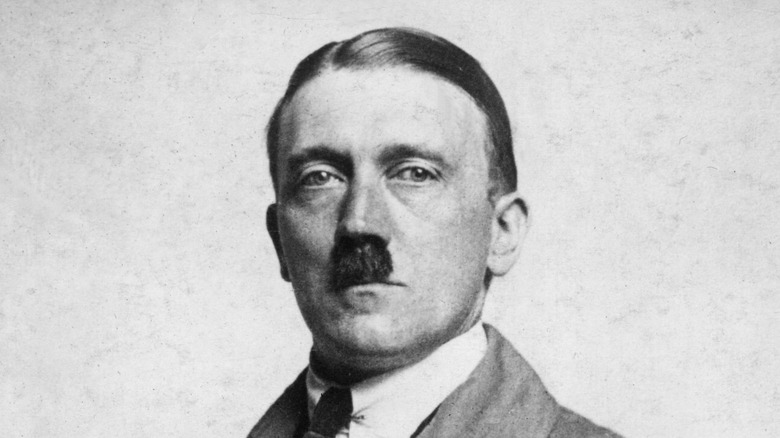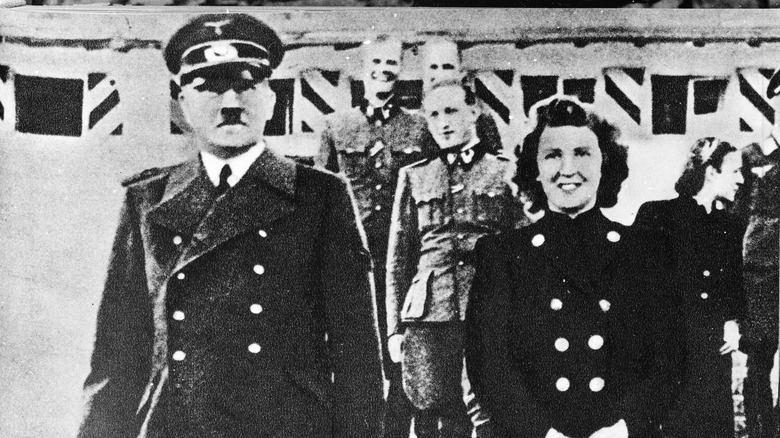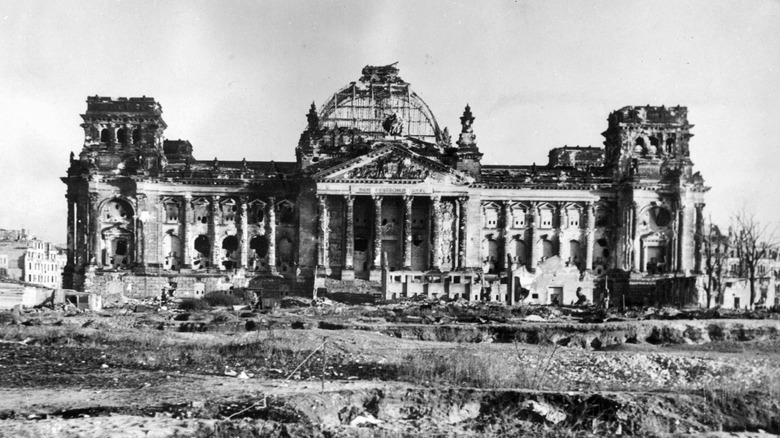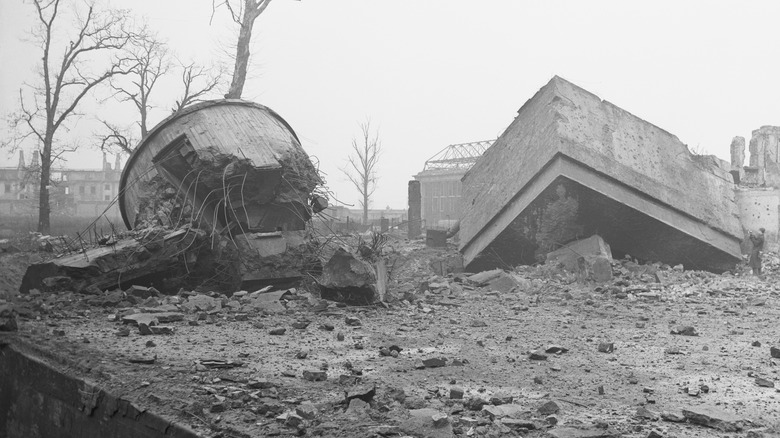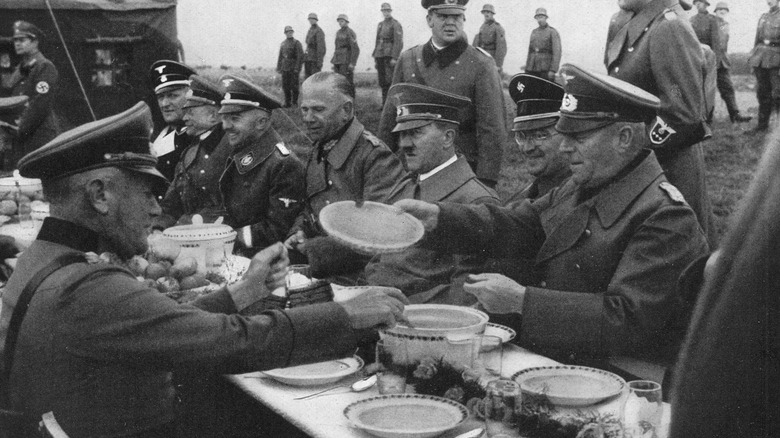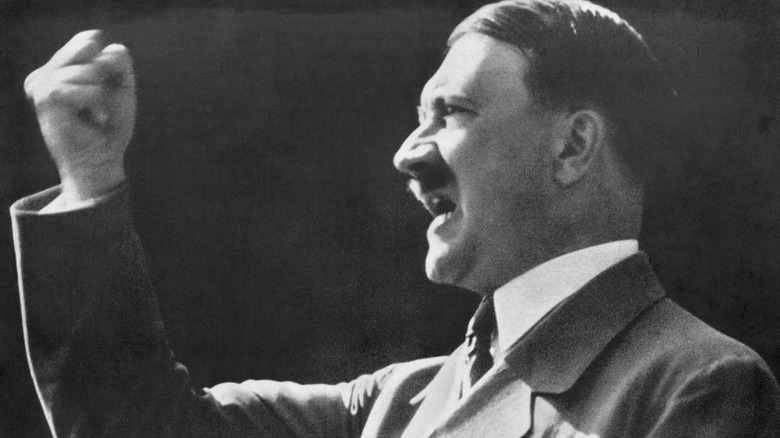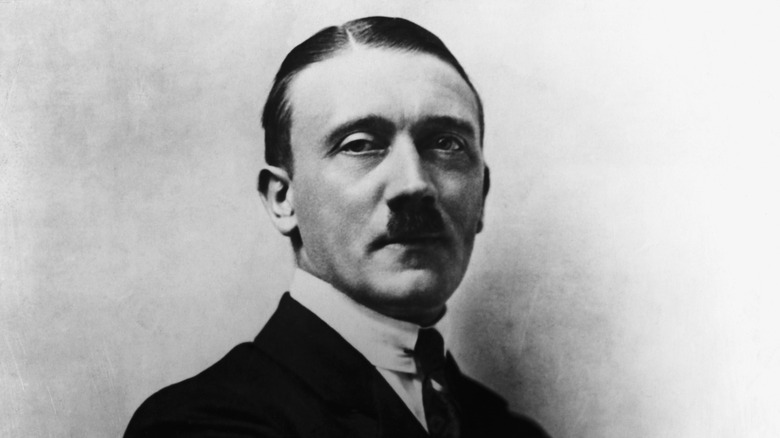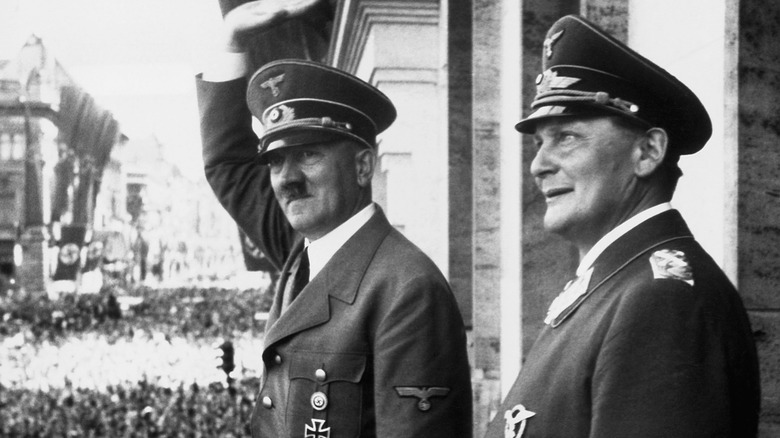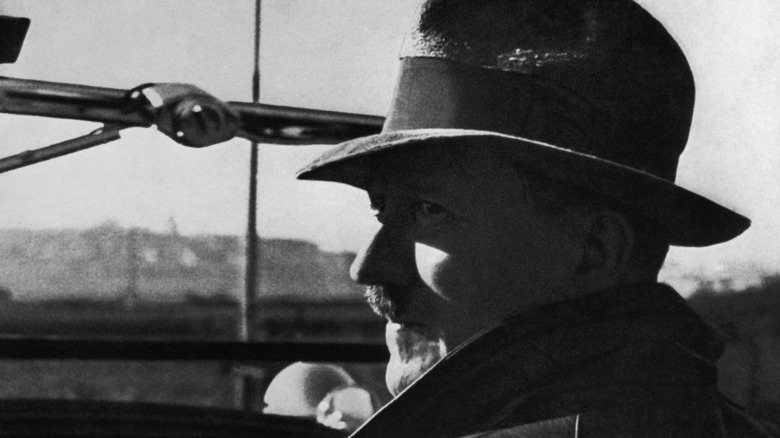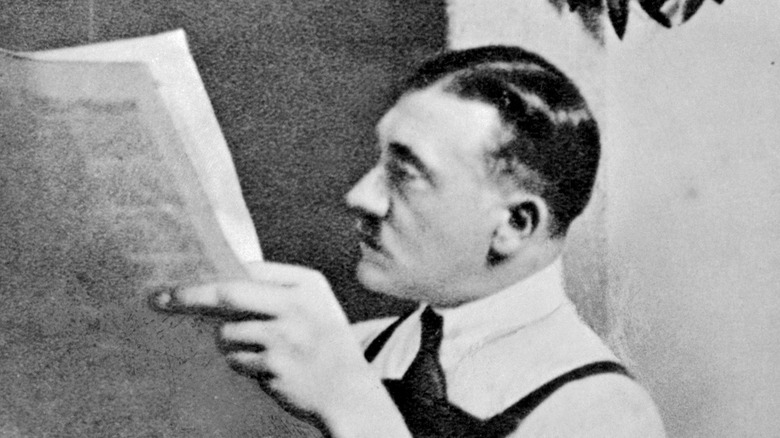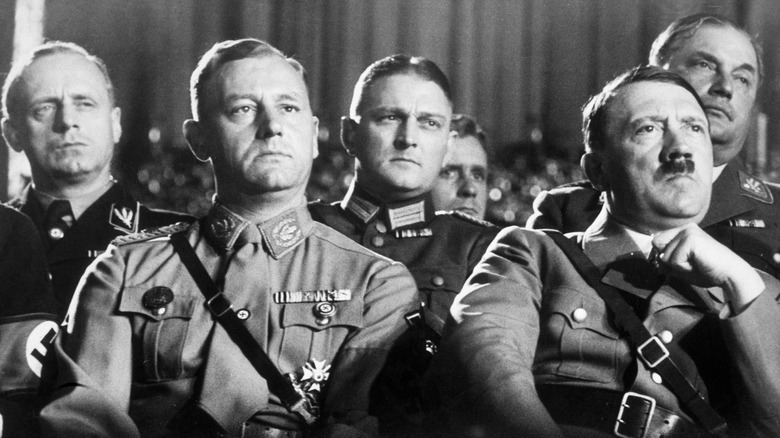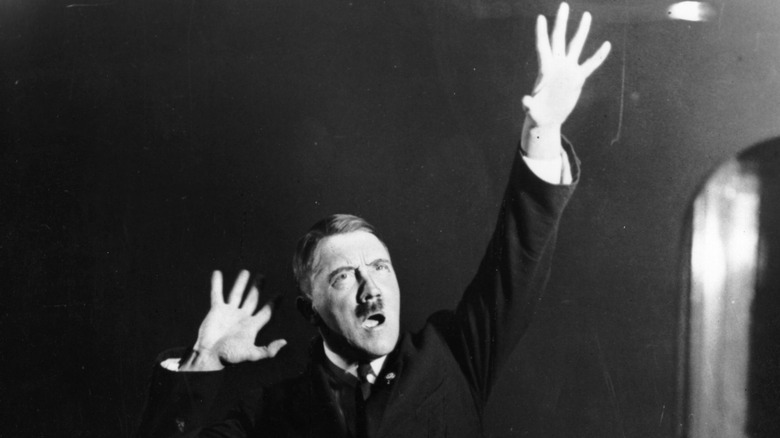Things We Learned About Hitler After He Died
During his political life, Nazi Party leader Adolf Hitler, who rose to power in the early 1930s to eventually consolidate all executive political power in Germany in his own hands in the fascist Third Reich, cultivated an image of strength and power. Much of Hitler's public image was established through the publication of his memoir, "Mein Kampf," which uncannily linked Hitler's apparent political awakening with the trials of the German people as a whole following their defeat in World War I and the economic disasters that followed. Later, his image would be carefully curated by his propagandists, most notably Joseph Goebbels, who oversaw a public relations campaign that permeated many corners of Nazi German society. Goebbels painted Hitler as a selfless servant of the people and lionized him as the kind of once-in-a-century hero who would return the country to a state of mythic greatness.
But much of what was transmitted about Hitler were lies, and many aspects of Hitler's private life were kept from the public. These only became clear in the years after his disturbing death in the final days of World War II. From the state of his health to the state of his finances, from his love life to his social life, there have been countless revelations about Hitler over the years, some of which came in news reports announcing his death while others took decades of dedicated research from historians — revelations that are still controversial today.
He was married hours before his death
Throughout his reign as Führer of the Third Reich, Hitler was portrayed to the public by his propaganda machine as a man concerned only with public service, who had no time for or interest in sex or relationships. However, at the time of his death, he had been in a long-term relationship with his partner, Eva Braun, for 14 years. The existence of Braun was largely a secret outside of the upper echelons of the Nazi Party, and the news that trickled through that Hitler had married shortly before his death was something of a surprise for newspaper readers on both sides of the conflict.
Before the fall of Berlin, Hitler and his closest friends and allies were cloistered in the "Führerbunker," an extensive series of subterranean, bombproof rooms located beneath the increasingly unsafe Reich Chancellery. While many reportedly tried to convince Hitler to flee the city, he was convinced that his only option was to stay until the bitter end.
With defeat and death at the door, Hitler and Braun were married in a bizarre underground ceremony, by a lawyer who was brought to the bunker expressly for that purpose. Hitler informed his key ally, Joseph Goebbels, that his marriage to Braun was a reward to her for staying loyal to him even as all seemed lost.
He died in a suicide pact
Hours after their wedding, Adolf Hitler and his longtime partner, Eva Braun, were both dead. Their bleak final hours were reflected in comments by Hitler's secretary, who was quoted in newspaper reports as the news broke as saying that the atmosphere following the wedding, replete with talk of suicide, was too much for her to bear.
The following day, the couple retreated to Hitler's study, never to be heard from again. Having given cyanide to Hitler's dog, Blondi, they sat together on a couch and breathed their last, Braun dying by cyanide poisoning and Hitler by a self-inflicted gunshot wound. In the days that followed, close allies who had committed to remaining with their once all-powerful leader despite impending defeat, also died by suicide. Notable among them was propagandist Joseph Goebbels, who poisoned himself alongside his wife and six children, and most likely Nazi leader Martin Bormann, though the details of his death are still debated.
That Hitler's marriage and his suicide were bound together is reflected in the fact that at the time of the production of his marriage certificate, he also dictated both his will and a political testament, in which he doubled down on the antisemitism that had been central to his worldview and railed against former allies who he saw as traitors instrumental to his downfall.
If you or someone you know is struggling or in crisis, help is available. Call or text 988 or chat 988lifeline.org
His final instructions made identifying his remains difficult
Before Adolf Hitler and Eva Braun died by suicide, the Nazi leader made plans for the disposal of his remains, ordering a consignment of gasoline with which his body might be set alight. Shortly after their bodies were discovered, the remains of Hitler and Braun were dragged to a patch of land outside the Reich Chancellery, where they were burned beyond recognition.
When Soviet forces arrived and confronted those who remained in the Führerbunker, they were pointed to the charred remains, which they confiscated without intending to confirm to their fellow Allied nations that Hitler was dead. In the years that followed, the lack of detailed confirmation that the remains were indeed Hitler's led to countless conspiracy theories concerning his demise, with some claiming that the Nazi leader had actually escaped and lived out his life under a false identity. Other myths, including the tidbit that Hitler had a missing testicle, also seemingly came from misinformation that spread during this time.
The remains taken by the Soviets included a skull fragment and a jawbone. While the skull fragment has not been conclusively linked to Hitler, the jawbone was eventually proven to be his through dental records.
Hitler was evangelical about vegetarianism
Along with Adolf Hitler's former career as a failed painter, one of the most commonly cited surprising facts about the inhumane fascist is that he was a vegetarian. Hitler's aversion to meat has been confirmed through several sources, including the testimony of the woman who was given the responsibility of tasting all of the Führer's meals to test them for poison. She claimed that all of the dishes she tasted were meatless, and though some sources have claimed that Hitler did occasionally indulge in meat, particularly sausages, no trace of meat was found on his teeth during a dental analysis of his remains.
There has also been plenty of debate over exactly what underpinned Hitler's vegetarianism. Some historians claim that Hitler turned to a meatless diet on the advice of physicians, while there is also the suggestion that he began to reject meat after the untimely death of his niece.
However, several sources note Hitler's love of animals and state that his vegetarianism was evangelical, to the point that he would attempt to unsettle dinner guests by reminding them they were eating the flesh of slaughtered beasts. "I didn't think you wanted to devour a dead corpse ... the flesh of dead animals. Cadavers!" he once said to a woman over dinner (per Psychology Today).
He was possibly addicted to opiates
In 2017, a new book, "Blitzed," by German author Norman Ohler, changed the way many people thought about drugs in the Third Reich and the apparent sobriety of Adolf Hitler himself. The Nazi propaganda masterminded by Joseph Goebbels painted Hitler as a man of incredible self-discipline, and it was widely reported that, along with his vegetarianism, he abstained from drinking alcohol and smoking. But the truth, Ohler told NPR, is very different.
According to the records of Hitler's personal physician, Dr. Theo Morell, which Ohler accessed when researching his book, the Nazi leader was actually frequently prescribed a wide range of intravenous drugs and pills. In the early days of their working relationship, much of what Morell gave to Hitler were simply doses of vitamins. However, after Hitler fell ill at a crucial moment in the war, Morell began to administer opiates and hormones, with dosages of the former increasing dramatically following a bomb attack assassination attempt against Hitler in 1944.
Ohler is convinced that Hitler was addicted to opiates at the time of his death — indeed, Morell was fired in April 1945 and banished from the Führerbunker. He also notes that Hitler would have been administered cocaine — a common painkiller in parts of Europe at the time — which means he was on a "speedball," or a combination of stimulants and depressants, for much of his later life.
He had other debilitating health issues
Adolf Hitler's medical history has been of great interest to researchers in the fields of both history and medicine. Over the decades since his death, the leader of the Third Reich has been identified as potentially having suffered from a wide range of medical issues, some of which have been confirmed by the notes of the doctors who treated him. Affected by both a mustard gas attack during World War I and the assassination attempt toward the end of his life, Hitler had cardiovascular and gastric issues, headaches, and vision problems. Author Norman Ohler suggests that footage of Hitler in his final months that shows him shaking uncontrollably is evidence of withdrawal symptoms due to the scarcity of opiates, but other academics have claimed he was showing signs of Parkinson's. Dr. Fritz Redlich has put Hitler's headaches and heart and vision issues down to an autoimmune disease called giant cell arteritis while also diagnosing him with various bladder ailments.
Since his death, many researchers in the fields of psychiatry and psychology have attempted to map Hitler's psychological profile. As one of the most evil men who ever lived, his inhumanity to other human beings has often been framed as the result of a form of madness that came to infect much of German society during his reign. However, the disturbing truth is that researchers such as Redlich, whose "Hitler: Diagnosis of a Destructive Prophet" was published in 1998, believe that Hitler was in control of his mental faculties the majority of the time, and that his crimes were committed with "pride and enthusiasm," per The New York Times.
Hitler's hidden billions
In Adolf Hitler's memoir, "Mein Kampf," which framed his worldview as having been built upon the struggles of his early life, Hitler paints himself as a man who rose out of poverty to become the right man at the right time to selflessly bring Germany into a new age of cultural superiority and prosperity. Central to the propaganda machine that worked around him throughout his rise and reign was the idea that Hitler had no interest in worldly possessions, luxury, or self-indulgence; he was concerned only with the good of the country.
But the reality for Hitler and his cronies was far different, with the Führer not only claiming extensive royalties from his memoir — a copy of which was given to every married couple in Germany, with local authorities footing the bill — but also taking from Nazi Party funds or government coffers. The chaos at the end of World War II and the unconventional way that Hitler freely used party and government finances during his reign have made it difficult for historians to get a full overview of the Nazi leader's wealth, but most agree that he was exceptionally rich in both cash and assets. In 1996, it was reported that investigators attempting to trace possessions stolen from Jewish people persecuted by the Nazi Party had discovered secret Swiss bank accounts that were believed to hold Hitler's royalties from "Mein Kampf," with later researchers suggesting that Hitler, who did not pay taxes, may have hoarded billions.
He misrepresented his war experience
The importance of Adolf Hitler's memoir "Mein Kampf" in creating a narrative around the fascist leader that could help him win the support of everyday Germans cannot be overstated. And central to Hitler's rags to riches story that saw him transform from failed artist to would-be champion of the people was his military service during World War I.
Hitler was reportedly eager to enlist with the German army when war broke out, though he ended up working as a dispatch runner rather than a frontline soldier. Nevertheless, he was injured multiple times, first by shrapnel in 1916 and then in a mustard gas attack in 1918. Hitler was recovering in a military hospital when news filtered through that Germany had been defeated, a moment that is commonly held to have been foundational to his later radicalization. During his time in the military, he was awarded the prestigious Iron Cross twice. He later lionized his service in his memoirs.
However, recent research has cast a more nuanced light on Hitler's war service. In 2010, historian Dr. Thomas Weber revealed new evidence found in a cache of documents related to Hitler's wartime regiment that showed his job to have been relatively danger-free compared to those of many of his colleagues in other regiments (via The Guardian). Letters from Hitler's colleagues also depict him as an unliked loner and laughing stock who was considered lacking in practical skill by his fellow soldiers, who called him a "rear-area pig" (via The Conversation).
His sister-in-law claimed he was a terrible house guest
Adolf Hitler was born in the village of Braunau am Inn, Austria, and raised in the city of Linz. After a spell in Vienna when he attempted to make it as an artist, he moved to Munich in 1913, petitioning to be allowed to serve on the German side when the war broke out. As one of the most consequential people in 20th century European history, most details of Hitler's early life have been pinned down by generations of historians. However, there is one period of his life that is still hotly debated: the winter prior to his arrival in Munich, when, some say, he went to visit his brother Alois and his Irish wife, Bridget, in Liverpool, England.
Bridget claimed in her memoirs that she and Alois had been expecting the arrival of Alois' sister, Angela, and her husband to help with Alois' business. However, Adolf appeared at the station in their stead. She wrote that Adolf stayed with her family for six months, during which he ranted at Bridget about the future of Germany and attempted to dominate her with his diatribes.
In another notable passage, Bridget claimed that she was the one who told her brother-in-law to trim his mustache, which he then wore in the fashionable and elaborate "Kaiser" style, thus being responsible for his trademark look (though various theories exist about the true origin of Hitler's mustache).
He bored his friends with his fandom
The list of charges against Adolf Hitler, especially following the revelation of the mass murder undertaken at his command now known as the Holocaust, have quite rightly seen him remain in the world's collective memory as one of the most reviled figures to have ever lived. However, as well as his impact on the world, decades of research and testimony from those who knew him have given historians key insights into his personal life, personality, and habits ... and it turns out that Hitler was also a pretty annoying person to be around.
Heinrich Hoffmann was a psychiatrist, illustrator, and Hitler's personal photographer. He documented the fascist's every move, and as such, he spent a great deal of time with Hitler — indeed, his memoir, which was first published in English in 1955, is titled "Hitler Was My Friend." In it, Hoffmann recalls that Hitler was obsessive in his tastes in music and film, playing the same pieces repeatedly. "The joy which the eternal repetition of his favorite music gave Hitler was a delight which I could not share with him," Hoffmann wrote, noting that Hitler seemed to listen unwaveringly to Wagner, Strauss, and Lehar, getting angry when his companions suggested alternative music. "As with music, so with films Hitler delighted to have endlessly repeated those which pleased him," Hoffmann added. "And when I was staying with him, I had no option but to conform." Some films Hitler forced his companions to watch more than 20 times over many visits.
There were silly photos taken of Hitler practicing his speeches
Adolf Hitler was a renowned orator whose verbose, animated, and frankly scary speeches whipped his audiences into a frenzy of hate and anger against the scapegoats the Nazi leader claimed were the causes of German society's ills. His abilities undoubtedly won him much support and cemented his image as a populist strongman across Germany and beyond.
But Hitler's image wasn't entirely natural; like many politicians, he worked hard on his stage presence with regular practice sessions and even had his photographer, Heinrich Hoffmann, take numerous photographs of him striking various dramatic poses. These images were deeply personal, intended to help him discover which poses were the most effective. Conscious that many of the photographs made him look rather silly, Hitler ordered Hoffmann to destroy them. However, the photographer secretly kept them, which, along with Hoffmann's memoirs, offers a previously unseen insight into the pomposity and ridiculousness beneath the strongman veneer.
